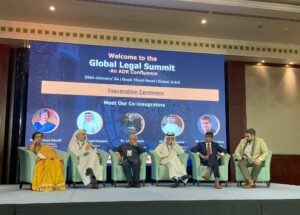Earlier today, at the Global Legal Summit held at Dusit Thani in Dubai, our Founding Partner, Dr Mahmood Hussain, participated in the inauguration alongside esteemed speakers such as Mrs. Pallavi Shroff, Managing Partner at Shardul Amarchand Mangaldas & Co, Dr. Lalit Bhasin, President of the Society Of Indian Law Firms (SILF), Mr. Ali Ismael Al Zarooni, Founder and Managing Partner of Horizons & Co Law Firm, and Mr. Sameet Gambhir, Vice President & Company Secretary, DCM Shriram LTD.
The brief conversation focused on the role Artificial Intelligence (AI) plays in the legal landscape, particularly dispute resolution. There is no doubt that legislators, specialists, and legal experts must continue to work together if technology is to continue advancing and influencing arbitration in the future. Furthermore, the significant investment prospects provided by the bilateral commerce between India and the UAE, and the implementation of legislation reforms to improve the business environment support fostering a strong economic partnership. Overall, the inauguration ceremony featured an engaging discussion where the speakers shared their insights.

